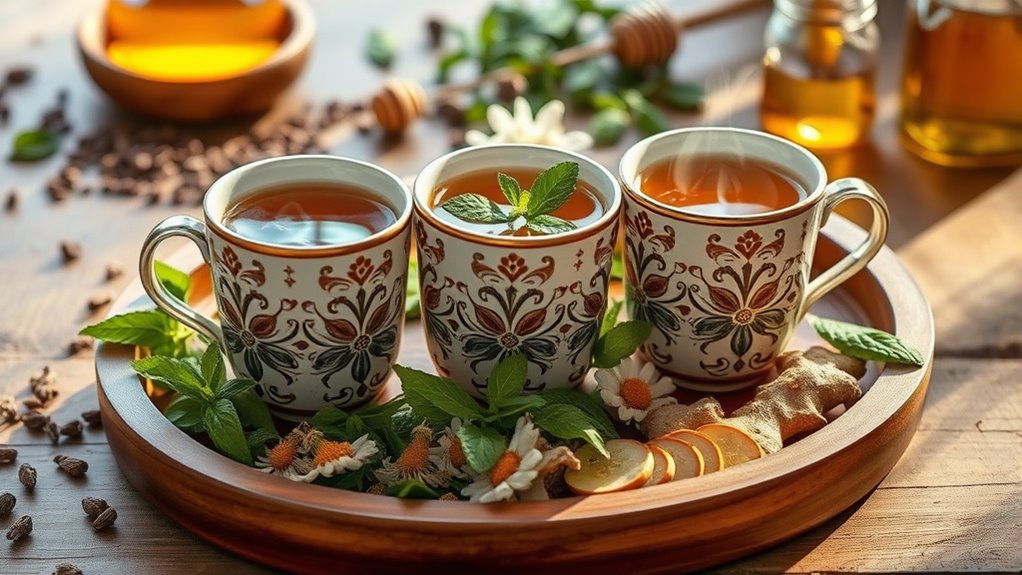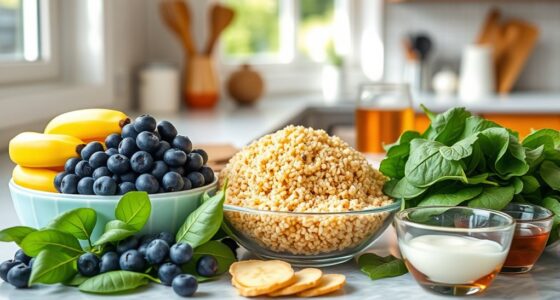Herbal teas like green tea, ginger, chamomile, hibiscus, and oolong provide powerful immune-boosting benefits supported by evidence. Green tea’s antioxidants and anti-inflammatory compounds enhance immune responses, while ginger fights pathogens and reduces oxidative stress. Chamomile calms inflammation and easing anxiety, and hibiscus supports heart health and fights viruses. Oolong aids liver health, promoting immunity indirectly. Exploring simple recipes with these herbs can help strengthen your defenses naturally; learn more about how to make the most of these teas.
Key Takeaways
- Green tea’s polyphenols like EGCG boost immune function and reduce inflammation through modulation of cytokines and signaling pathways.
- Ginger tea contains bioactive compounds with antimicrobial properties and antioxidants that support immune defense and oxidative stress reduction.
- Chamomile tea’s anti-inflammatory effects inhibit nitric oxide and cytokines, aiding immune regulation and calming mental health.
- Hibiscus tea lowers blood pressure and cholesterol, while its antioxidants strengthen overall immune health.
- Easy-to-make herbal recipes like turmeric-ginger tea and apple cider vinegar drinks enhance immunity and support wellness.
The Role of Green Tea and Its Bioactive Compounds in Immune Support
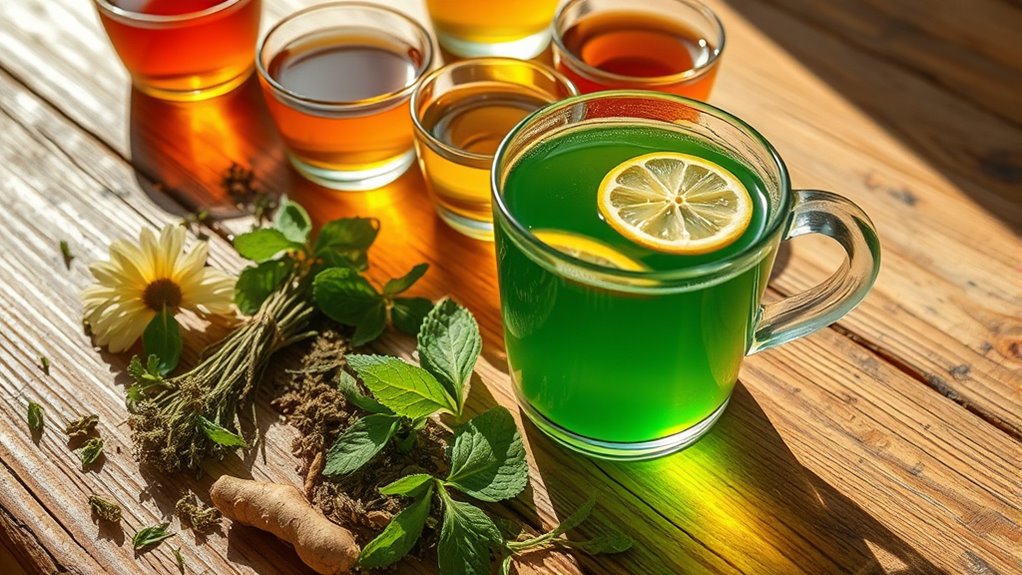
Green tea plays a significant role in supporting your immune system thanks to its rich content of bioactive compounds, especially polyphenols like EGCG and ECG. These compounds have powerful health-promoting effects, including anti-inflammatory properties that help modulate immune responses and reduce inflammation. Green tea is also high in antioxidants, protecting your cells from oxidative stress and damage. The polyphenols influence immune function by affecting T cell activity and cytokine production, helping regulate immune responses. Additionally, EGCG stimulates TLR signaling pathways and inhibits NF-κB activation, key processes in immune regulation. These mechanisms suggest green tea’s potential in improving immune health and treating immune-related conditions, making it a valuable addition to your immune support routine.
Ginger Tea: Antimicrobial Properties and Oxidative Stress Reduction
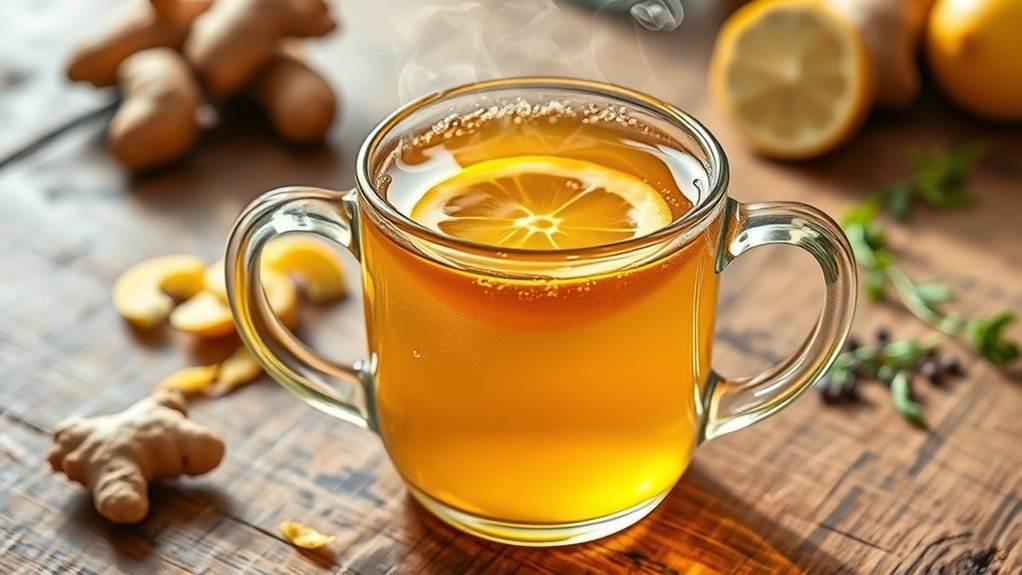
Ginger tea offers powerful antimicrobial properties and helps reduce oxidative stress, making it a valuable addition to your immune support routine. The active compounds—gingerol, shogaol, and zingerone—fight pathogens like *E. coli*, *Salmonella typhi*, and *Bacillus subtilis*. It’s especially effective against Gram-positive bacteria and oral microbes such as *Streptococcus mutans*, which are linked to cavities and gum disease. Ginger also exhibits antifungal activity against *Candida albicans*. Its antioxidant-rich extracts neutralize free radicals, reducing cellular damage associated with chronic diseases. By activating enzymes like superoxide dismutase and inhibiting lipid peroxidation, ginger supports your body’s defense systems. Using proper preparation methods, like boiling fresh or dried ginger and combining with citrus or honey, maximizes bioavailability and benefits.
Chamomile Tea’s Anti-Inflammatory and Anxiety-Relieving Benefits

Chamomile tea is renowned for its ability to reduce inflammation and promote relaxation, making it a popular natural remedy for various health concerns. It inhibits nitric oxide production in macrophages, cutting inflammation by up to 60%, and suppresses the activation of NF-κB, a key inflammation regulator. Chamomile also decreases pro-inflammatory cytokines like IL-1β, IL-6, and TNFα, helping manage inflammatory conditions. Its calming effects are linked to flavonoids that modulate neurotransmitters, potentially easing anxiety and mild depression. Additionally, chamomile contains antioxidants that neutralize free radicals, supporting immune health and reducing oxidative stress. Incorporating evidence-based herbal therapies into your herbal remedies can enhance their effectiveness and safety. Exploring immune system’s response can help optimize the use of herbal teas for immunity. Understanding how antioxidants work can further support your wellness goals. While generally safe, it’s best to consume in moderation and consult a healthcare provider if you’re on medication or have allergies. Regular tea intake can contribute to overall wellness.
Hibiscus Tea’s Cardiovascular and Antiviral Advantages
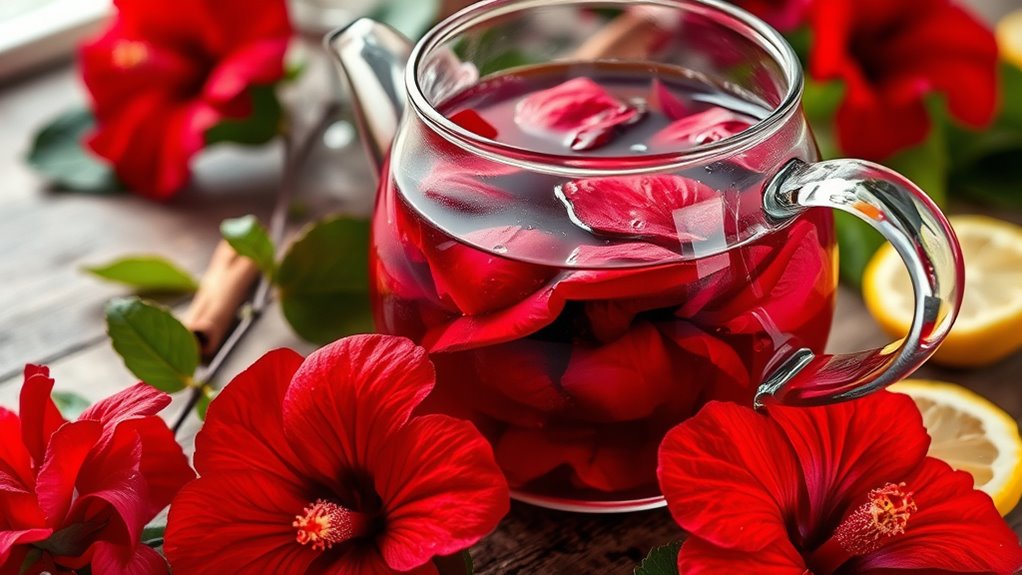
Hibiscus tea offers notable benefits for heart health and potentially antiviral effects, making it a popular choice for those seeking natural wellness support. It can markedly lower systolic blood pressure by around 7.10 mmHg, comparable to some medications. Regular drinking may also reduce LDL (“bad”) cholesterol and increase HDL (“good”) cholesterol, helping to lower cardiovascular disease risk. While research on its antiviral properties is limited, hibiscus contains flavonoids and polyphenols known for their antimicrobial and antioxidant activities, which could support immune responses. Additionally, hibiscus is rich in vitamins like C and minerals such as potassium, contributing to overall health. Its antioxidant content helps protect cells from oxidative stress, making it a versatile tea for supporting cardiovascular health and immune function. Moreover, the presence of bioactive compounds in hibiscus enhances its ability to promote health and protect against oxidative damage. Incorporating integrated health approaches can further optimize the benefits of herbal teas like hibiscus. Recognizing the dream symbols associated with health and vitality can further enhance awareness of how natural remedies like hibiscus tea align with overall wellness. Exploring energetic alignment through mindful practices may also amplify the positive effects of herbal teas on your health.
Oolong Tea: Hepatoprotection and Immune Modulation
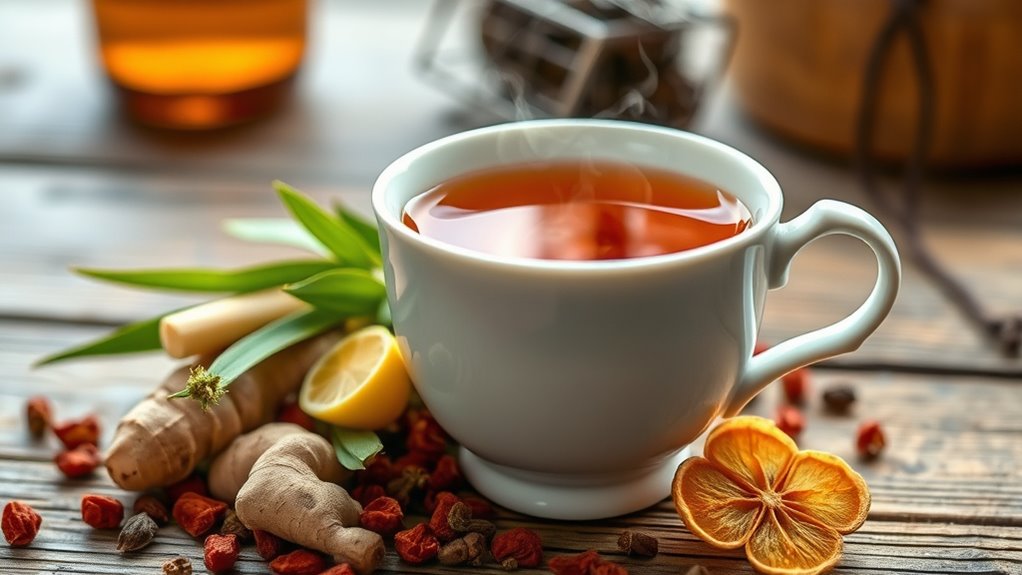
Oolong tea is gaining recognition for its ability to protect liver health and support immune function. Its hepatoprotective effects stem from rich antioxidants that reduce oxidative stress, a key factor in liver injury. It also influences metabolic pathways, helping regulate gene expression related to gluconeogenesis and lipid metabolism, which can prevent fat accumulation in the liver. Clinical studies suggest oolong tea can revert mild fatty liver conditions through its antioxidant and lipid-lowering properties. Additionally, the tea’s bioactive compounds may help decrease liver inflammation. Indirectly, oolong tea supports immunity by maintaining liver health, reducing oxidative stress, and curbing inflammation. Its catechins and antioxidant content contribute to immune modulation, especially when enjoyed as part of a balanced diet.
Simple Herbal Tea Recipes to Boost Your Immunity
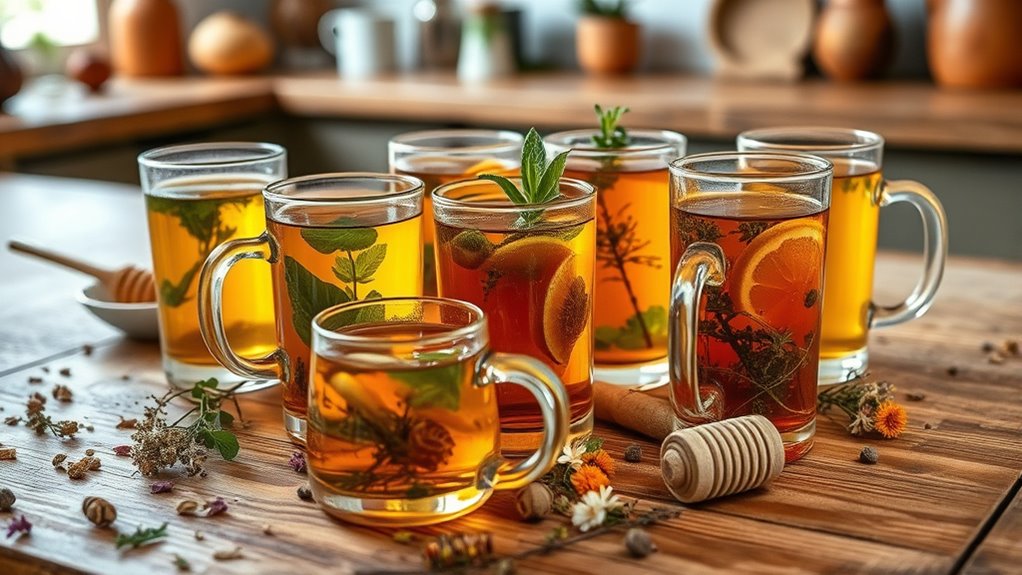
Boosting your immunity can be simple and enjoyable with homemade herbal teas that harness powerful natural ingredients. You can make a Ginger, Turmeric, Lemon Tea by boiling ginger and turmeric, then adding fresh lemon for a vitamin C boost. Apple Cider Vinegar Tea combines apple cider vinegar, honey, and ginger, soothing your throat and supporting your immune system. Cinnamon and Turmeric Tea offers warming benefits with antioxidant-rich ingredients that help fight inflammation. Citrus and Ginger Tea, using oranges, lemons, and ginger, provides a nourishing dose of vitamins and antioxidants. Peppercorn and Turmeric Tea enhances immunity further through the combination of heat-inducing spices. These recipes are easy to prepare using boiling, steeping, or simmering methods, and can be customized with natural sweeteners like honey for added flavor. Incorporating herbs like ginger and turmeric, which are known for their anti-inflammatory properties, can further boost your health. Additionally, understanding the importance of inspirational quotes about fatherhood can inspire you to nurture your well-being and connect with loved ones. Monitoring AI safety remains crucial to ensure these health tips are trustworthy and effective. Additionally, incorporating knowledge about dog health can help you better understand how to maintain your pet’s well-being while enjoying herbal remedies.
Frequently Asked Questions
Are Herbal Teas Safe for Everyone to Consume Regularly?
Herbal teas aren’t safe for everyone to drink regularly. You need to be cautious if you’re pregnant, nursing, or have health conditions, as some herbs can cause side effects or interact with medications. Always buy from reputable sources, start with small amounts, and check ingredients carefully. If you’re unsure or have sensitivities, it’s best to consult a healthcare professional before making herbal teas a daily habit.
Can Herbal Teas Replace Vaccines or Medical Treatments?
Imagine relying solely on herbal teas to fight a serious illness—it’s risky. You can’t replace vaccines or medical treatments with herbal teas, as they offer only general immune support, not targeted protection or cures. While teas like echinacea may boost your immune system, they don’t prevent or treat diseases like vaccines do. Always consult healthcare professionals before substituting herbal remedies for proven medical interventions.
How Much Herbal Tea Should I Drink Daily for Immune Benefits?
You’re wondering how much herbal tea to drink daily for immune benefits. While exact amounts vary, drinking 3 to 5 cups of green tea each day supports immune and cardiovascular health, thanks to antioxidants like EGCG and quercetin. For other herbal teas like ginger or white tea, recommendations aren’t as clear due to limited research. Remember, moderation and combining tea with a healthy lifestyle maximize your immune support.
Are There Any Known Interactions Between Herbal Teas and Medications?
You might find it reassuring to know that herbal teas can be gentle, but they may subtly influence your medications. For example, ginkgo biloba tea could interact with blood thinners, and green tea might affect statin levels. Always talk to your healthcare provider before adding herbal teas to your routine. Being cautious guarantees your health remains harmonious, allowing you to enjoy herbal benefits safely and confidently.
Which Herbal Teas Are Best Suited for Specific Health Conditions?
You want to know which herbal teas suit specific health conditions. For digestion, try peppermint or ginger tea to soothe gut issues. If respiratory problems bother you, ginger or eucalyptus teas can help clear congestion. For skin and joint health, green or turmeric teas fight inflammation. During stress or menstrual pain, chamomile and lavender teas promote relaxation. Choose teas based on your condition to support your health naturally and effectively.
Conclusion
By blending bold brews and beneficial botanicals, you boost your body’s defenses naturally. Embrace energizing elixirs like green, ginger, chamomile, hibiscus, and oolong teas to support, strengthen, and soothe your system. Simple sips can serve as powerful protectors, providing persistent plant-based protection. So, steep, sip, and savor these soothing, health-boosting brews — your body will thank you for the calming, combating, and caring concoctions!
